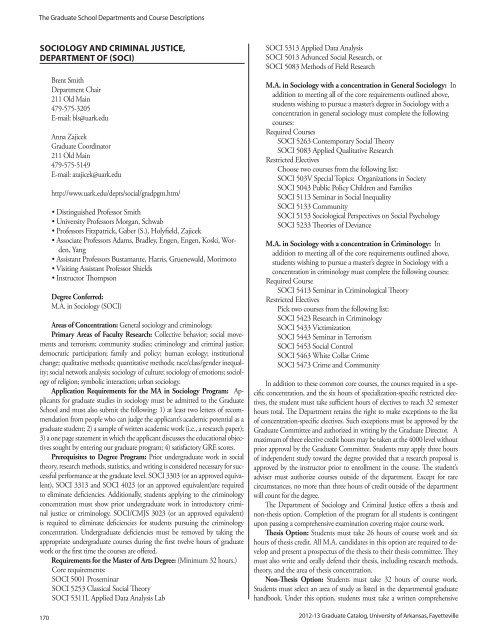PDF of the Graduate Catalog of Studies (2.6 MB)
PDF of the Graduate Catalog of Studies (2.6 MB)
PDF of the Graduate Catalog of Studies (2.6 MB)
You also want an ePaper? Increase the reach of your titles
YUMPU automatically turns print PDFs into web optimized ePapers that Google loves.
The <strong>Graduate</strong> School Departments and Course Descriptions<br />
SOCIOLOGY AND CRIMINAL JUSTICE,<br />
Department <strong>of</strong> (soci)<br />
170<br />
Brent Smith<br />
Department Chair<br />
211 Old Main<br />
479-575-3205<br />
E-mail: bls@uark.edu<br />
Anna Zajicek<br />
<strong>Graduate</strong> Coordinator<br />
211 Old Main<br />
479-575-5149<br />
E-mail: azajicek@uark.edu<br />
http://www.uark.edu/depts/social/gradpgm.htm/<br />
• Distinguished Pr<strong>of</strong>essor Smith<br />
• University Pr<strong>of</strong>essors Morgan, Schwab<br />
• Pr<strong>of</strong>essors Fitzpatrick, Gaber (S.), Holyfield, Zajicek<br />
• Associate Pr<strong>of</strong>essors Adams, Bradley, Engen, Engen, Koski, Worden,<br />
Yang<br />
• Assistant Pr<strong>of</strong>essors Bustamante, Harris, Gruenewald, Morimoto<br />
• Visiting Assistant Pr<strong>of</strong>essor Shields<br />
• Instructor Thompson<br />
Degree Conferred:<br />
M.A. in Sociology (SOCI)<br />
Areas <strong>of</strong> Concentration: General sociology and criminology.<br />
Primary Areas <strong>of</strong> Faculty Research: Collective behavior; social movements<br />
and terrorism; community studies; criminology and criminal justice;<br />
democratic participation; family and policy; human ecology; institutional<br />
change; qualitative methods; quantitative methods; race/class/gender inequality;<br />
social network analysis; sociology <strong>of</strong> culture; sociology <strong>of</strong> emotions; sociology<br />
<strong>of</strong> religion; symbolic interaction; urban sociology.<br />
Application Requirements for <strong>the</strong> MA in Sociology Program: Applicants<br />
for graduate studies in sociology must be admitted to <strong>the</strong> <strong>Graduate</strong><br />
School and must also submit <strong>the</strong> following: 1) at least two letters <strong>of</strong> recommendation<br />
from people who can judge <strong>the</strong> applicant’s academic potential as a<br />
graduate student; 2) a sample <strong>of</strong> written academic work (i.e., a research paper);<br />
3) a one page statement in which <strong>the</strong> applicant discusses <strong>the</strong> educational objectives<br />
sought by entering our graduate program; 4) satisfactory GRE scores.<br />
Prerequisites to Degree Program: Prior undergraduate work in social<br />
<strong>the</strong>ory, research methods, statistics, and writing is considered necessary for successful<br />
performance at <strong>the</strong> graduate level. SOCI 3303 (or an approved equivalent),<br />
SOCI 3313 and SOCI 4023 (or an approved equivalent)are required<br />
to eliminate deficiencies. Additionally, students applying to <strong>the</strong> criminology<br />
concentration must show prior undergraduate work in introductory criminal<br />
justice or criminology. SOCI/CMJS 3023 (or an approved equivalent)<br />
is required to eliminate deficiencies for students pursuing <strong>the</strong> criminology<br />
concentration. Undergraduate deficiencies must be removed by taking <strong>the</strong><br />
appropriate undergraduate courses during <strong>the</strong> first twelve hours <strong>of</strong> graduate<br />
work or <strong>the</strong> first time <strong>the</strong> courses are <strong>of</strong>fered.<br />
Requirements for <strong>the</strong> Master <strong>of</strong> Arts Degree: (Minimum 32 hours.)<br />
Core requirements:<br />
SOCI 5001 Proseminar<br />
SOCI 5253 Classical Social Theory<br />
SOCI 5311L Applied Data Analysis Lab<br />
SOCI 5313 Applied Data Analysis<br />
SOCI 5013 Advanced Social Research, or<br />
SOCI 5083 Methods <strong>of</strong> Field Research<br />
M.A. in Sociology with a concentration in General Sociology: In<br />
addition to meeting all <strong>of</strong> <strong>the</strong> core requirements outlined above,<br />
students wishing to pursue a master’s degree in Sociology with a<br />
concentration in general sociology must complete <strong>the</strong> following<br />
courses:<br />
Required Courses<br />
SOCI 5263 Contemporary Social Theory<br />
SOCI 5083 Applied Qualitative Research<br />
Restricted Electives<br />
Choose two courses from <strong>the</strong> following list:<br />
SOCI 503V Special Topics: Organizations in Society<br />
SOCI 5043 Public Policy Children and Families<br />
SOCI 5113 Seminar in Social Inequality<br />
SOCI 5133 Community<br />
SOCI 5153 Sociological Perspectives on Social Psychology<br />
SOCI 5233 Theories <strong>of</strong> Deviance<br />
M.A. in Sociology with a concentration in Criminology: In<br />
addition to meeting all <strong>of</strong> <strong>the</strong> core requirements outlined above,<br />
students wishing to pursue a master’s degree in Sociology with a<br />
concentration in criminology must complete <strong>the</strong> following courses:<br />
Required Course<br />
SOCI 5413 Seminar in Criminological Theory<br />
Restricted Electives<br />
Pick two courses from <strong>the</strong> following list:<br />
SOCI 5423 Research in Criminology<br />
SOCI 5433 Victimization<br />
SOCI 5443 Seminar in Terrorism<br />
SOCI 5453 Social Control<br />
SOCI 5463 White Collar Crime<br />
SOCI 5473 Crime and Community<br />
In addition to <strong>the</strong>se common core courses, <strong>the</strong> courses required in a specific<br />
concentration, and <strong>the</strong> six hours <strong>of</strong> specialization-specific restricted electives,<br />
<strong>the</strong> student must take sufficient hours <strong>of</strong> electives to reach 32 semester<br />
hours total. The Department retains <strong>the</strong> right to make exceptions to <strong>the</strong> list<br />
<strong>of</strong> concentration-specific electives. Such exceptions must be approved by <strong>the</strong><br />
<strong>Graduate</strong> Committee and authorized in writing by <strong>the</strong> <strong>Graduate</strong> Director. A<br />
maximum <strong>of</strong> three elective credit hours may be taken at <strong>the</strong> 4000 level without<br />
prior approval by <strong>the</strong> <strong>Graduate</strong> Committee. Students may apply three hours<br />
<strong>of</strong> independent study toward <strong>the</strong> degree provided that a research proposal is<br />
approved by <strong>the</strong> instructor prior to enrollment in <strong>the</strong> course. The student’s<br />
adviser must authorize courses outside <strong>of</strong> <strong>the</strong> department. Except for rare<br />
circumstances, no more than three hours <strong>of</strong> credit outside <strong>of</strong> <strong>the</strong> department<br />
will count for <strong>the</strong> degree.<br />
The Department <strong>of</strong> Sociology and Criminal Justice <strong>of</strong>fers a <strong>the</strong>sis and<br />
non-<strong>the</strong>sis option. Completion <strong>of</strong> <strong>the</strong> program for all students is contingent<br />
upon passing a comprehensive examination covering major course work.<br />
Thesis Option: Students must take 26 hours <strong>of</strong> course work and six<br />
hours <strong>of</strong> <strong>the</strong>sis credit. All M.A. candidates in this option are required to develop<br />
and present a prospectus <strong>of</strong> <strong>the</strong> <strong>the</strong>sis to <strong>the</strong>ir <strong>the</strong>sis committee. They<br />
must also write and orally defend <strong>the</strong>ir <strong>the</strong>sis, including research methods,<br />
<strong>the</strong>ory, and <strong>the</strong> area <strong>of</strong> <strong>the</strong>sis concentration.<br />
Non-Thesis Option: Students must take 32 hours <strong>of</strong> course work.<br />
Students must select an area <strong>of</strong> study as listed in <strong>the</strong> departmental graduate<br />
handbook. Under this option, students must take a written comprehensive<br />
2012-13 <strong>Graduate</strong> <strong>Catalog</strong>, University <strong>of</strong> Arkansas, Fayetteville












